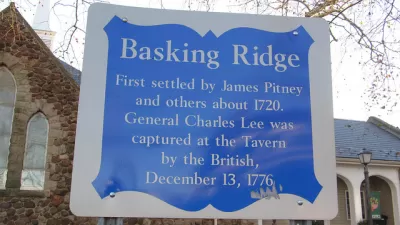The recent controversies surrounding the building of mosques in cities across America have their resolution in one simple acronym: RLUIPA.
"The Religious Land Use and Institutionalized Persons Act, whose initials are commonly pronounced Ruh-LOO-pa, was approved unanimously by Congress in 2000. Its chief sponsor was Senator Orrin G. Hatch, Republican of Utah.
The law sets a high bar for any government action that would impose zoning or other restrictions on a religious institution. Any such action must serve a 'compelling government interest' while also being 'the least restrictive means' of furthering that interest, the law says."
Many land use law experts have argued that RLUIPA offers the legal guidance for how these sorts of controversies can be resolved. Despite the protections offered through the law, opponents of mosque projects remain vocal and powerful.
FULL STORY: Zoning Law Aside, Mosque Projects Face Battles

Planetizen Federal Action Tracker
A weekly monitor of how Trump’s orders and actions are impacting planners and planning in America.

Map: Where Senate Republicans Want to Sell Your Public Lands
For public land advocates, the Senate Republicans’ proposal to sell millions of acres of public land in the West is “the biggest fight of their careers.”

Restaurant Patios Were a Pandemic Win — Why Were They so Hard to Keep?
Social distancing requirements and changes in travel patterns prompted cities to pilot new uses for street and sidewalk space. Then it got complicated.

DC Area County Eliminates Bus Fares
Montgomery County joins a growing trend of making transit free.

Platform Pilsner: Vancouver Transit Agency Releases... a Beer?
TransLink will receive a portion of every sale of the four-pack.

Toronto Weighs Cheaper Transit, Parking Hikes for Major Events
Special event rates would take effect during large festivals, sports games and concerts to ‘discourage driving, manage congestion and free up space for transit.”
Urban Design for Planners 1: Software Tools
This six-course series explores essential urban design concepts using open source software and equips planners with the tools they need to participate fully in the urban design process.
Planning for Universal Design
Learn the tools for implementing Universal Design in planning regulations.
Heyer Gruel & Associates PA
JM Goldson LLC
Custer County Colorado
City of Camden Redevelopment Agency
City of Astoria
Transportation Research & Education Center (TREC) at Portland State University
Camden Redevelopment Agency
City of Claremont
Municipality of Princeton (NJ)




























